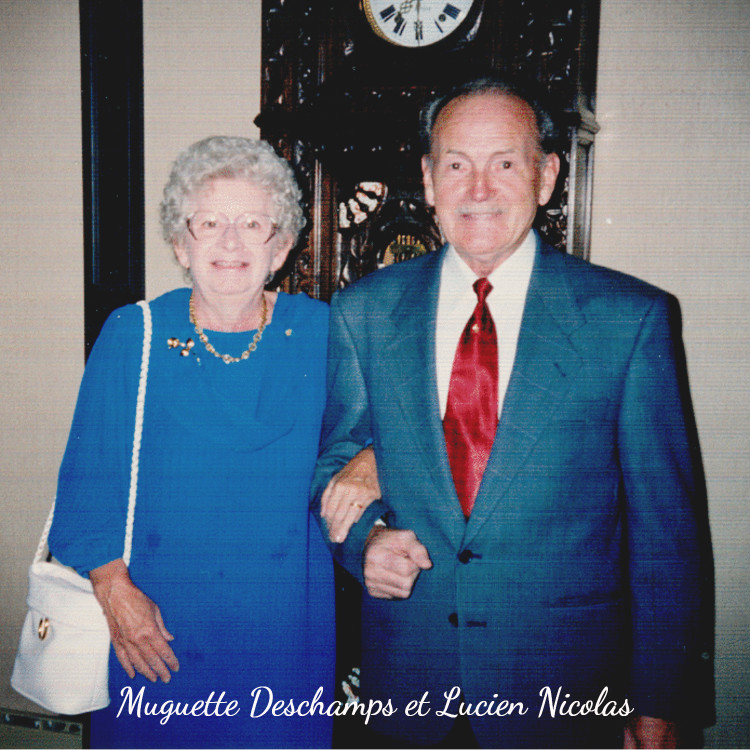The first of May is a bank holiday in several European countries as it celebrates la fête du travail.
For me, 1 May will always be associated with the birthday of my beloved paternal grandmother.
My father’s mother was from Paris, where she spent half of her life before moving to Montreal, Canada, in 1966, with her family. Her name was Muguette Deschamps, which literally means Lily of the valley (muguet) of the fields (des champs), a most fitting name for this sweet lady who adored the delicate fragrance of the ephemeral muguet. Her parents named her Muguette as she was born on 1 May, la fête du muguet.
Bien sûr, her favourite perfume was J’adore, by Dior, whose notes de coeur are mostly composed of muguet!
Jean-Paul Gerlain couldn’t be more true when he said that ”perfume is the most intense form of memory”. Whenever I smell this perfume, I inevitably think about my lovely Muguette who passed away 9 years ago. It was a very emotional moment for me as she passed away while I was on a trip in Paris to audition for Opéra Bastille, at the beginning of my opera career.
Do you struggle when trying to share stories about your life and your beloved ones using the past tenses in French?
Here Are Some Great Tips To Better Tell A Story In The Past In French
Passé composé
1. Describe an action, a series of actions or repeated actions which took place in the past and are now over.
- J’ai vu Isabelle mardi dernier. (I saw Isabelle last Tuesday.)
- Nous sommes allées au cinéma, nous avons vu un film français et ensuite, nous sommes allées prendre un verre. Nous avons bien papoté! (We went to the cinema, we saw a French movie, and then, we went out for drinks. We chatted a lot!)
- Il m’a appelé 10 fois aujourd’hui. (He called me 10 times today.)
2. Describe an action which happened at a specific point in time or for a specific period of time in the past.
- Elle a habité à Montréal pendant 3 ans. (She lived in Montreal for three years.)
3. Reflexive verbs are always used with auxiliary ÊTRE.
- Il s’est levé vers 7h30 et s’est habillé rapidement. (He woke up around 7.30 AM and got dressed quickly.)
Key words: hier, dimanche dernier, la semaine passée, l’an dernier, il y a deux ans, jamais, déjà, une (2, 3,4,…) fois, longtemps, pendant 2 jours, toute la semaine, etc.
Qu’est-ce que vous avez fait hier?
(A1 level)
Hier, je me suis réveillée vers 7h00 au son de mon réveil-matin. Je me suis levée 10 minutes plus tard et je suis allée prendre une douche. J’ai ensuite pris mon petit déjeuner et j’ai bu un café bien corsé. J’ai quitté la maison vers 8h00 et j’ai pris le train. J’ai mis 30 minutes pour arriver au bureau. Le matin, j’ai répondu à mes courriels et j’ai terminé la préparation d’une importante présentation. J’ai déjeuné avec mes collègues dans un petit restaurant bien sympa. L’après-midi, j’ai participé à plusieurs réunions et je suis retournée à la maison vers 18h00. J’ai enfilé ma tenue de sport et mes baskets avant d’aller au cours de yoga qui m’a fait un bien fou!
Imparfait
1. Action in the past which isn’t over (no end/beginning) or habit in the past (used to).
- Je lisais un livre. (I was reading a book.)
- Quand j’étais étudiant(e), je lisais beaucoup de livres. (When I was a student, I used to read a lot of books.)
2. Description in the past (physical, state of mind, weather, etc.)
- Il pleuvait ce matin et j’étais un peu fatigué(e). (It was raining this morning and I was a bit tired.)
- Elle était très grande pour une petite fille de 4 ans. (She was very tall for a 4 year old girl.)
3. Two actions which take place at the same time in the past.
- Je parlais au téléphone pendant que mon fils jouait dans le salon. (I was speaking on the phone while my son was playing in the living room.)
Key words: d’habitude, d’ordinaire, habituellement, normalement, chaque jour, tous les jours rarement, pendant que, et, le mardi, tous les jeudis, etc.
Muguette Deschamps

(A2 level)
Ma grand-mère avait les cheveux blancs toujours bien coiffés. Elle avait les yeux bleus souvent rieurs ou tendres derrière ses grosses lunettes. Elle ne portait jamais de pantalons, seulement des robes ou des jupes avec un chemisier. Elle avait de belles mains qu’elle utilisait avec beaucoup d’agilité pour coudre et faire de la broderie. Elle était une excellente cuisinière et nous, ses quatre petites-filles, étions ravies de pouvoir déguster ses purées de pois cassés, ses steaks au beurre de Paris et ses gâteaux de semoule au caramel lorsqu’elle nous invitait à dîner chez elle. Elle nous lisait des contes de fées avant d’aller au lit et pouvait imiter toutes les voix. Notre histoire préférée était Barbe-Bleue. Même si nous avions très peur, nous la redemandions à chaque fois qu’elle venait nous garder. Nous aimions beaucoup lorsqu’elle nous parlait de son enfance à Paris. Cela nous faisait rêver et nous transportait dans son monde qui nous semblait si beau et si lointain.
Passé composé vs Imparfait
1. Action in the past which has been going on for a long(ish) period of time (imparfait) which is interrupted by another action (passé composé).
- Je lisais un livre quand le téléphone a sonné. (I was reading a book when the phone rang.)
- Je cuisinais lorsque la tempête a commencé. (I was cooking when the storm started.)
- Il allait au travail en vélo comme à chaque matin. Tout à coup, un chien est apparu de nul part et l’a poursuivi pendant plusieurs minutes. Il était terrorisé. (He was going to work on his bike like every morning. All of a sudden, a dog appeared out of nowhere and chased him for several minutes. He was filled with terror.)
2. Cause (imparfait) leading to a consequence (passé composé).
- Je n’ai pas pu venir à la fête parce que j’étais malade. (I couldn’t come to the party because I was sick.)
Key words: tout à coup, soudain, lorsque, quand, au même moment, au moment où, pendant ce temps, parce que, puisque, comme, etc.
Coco Chanel en Suisse
(A2 Level)
Saviez-vous que Coco Chanel a vécu en Suisse? En effet, cette icône de la mode française a dû quitter la France à la fin de la Deuxième Guerre mondiale parce qu’on la soupçonnait fortement d’avoir collaboré avec le mouvement nazi. Pour se faire oublier (et pardonner), elle s’est établie à Lausanne, où elle a vécu pendant plusieurs années. Elle a habité au Beau-Rivage, au Palace, a fait des séjours à la Clinique Valmont et s’est acheté une villa au chemin du Signal. La résidente actuelle de la villa a affirmé qu’«elle se partageait entre Paris et Lausanne, mais c’était ici, dans sa maison, qu’elle dessinait ses collections.» Elle est décédée au Ritz de la place Vendôme, à Paris, mais sa tombe se trouve en terres suisses. C’est même l’une des plus belles du cimetière du Bois-de-Vaux, à Lausanne.
How can I keep improving my French without breaking the bank?
Did you find my blogpost useful? If you need to improve your understanding and use of Les temps du passé (passé composé & imparfait), you will definitely enjoy our French Toolbox, perfect for learners of level A2 and above who want to improve their Everyday and Business French at their own pace. Learn more about our 80+ video recorded lessons à petit prix!
I hope you now have more tools to help you recount a story in the past in French!

Isabelle
As a native Québécoise, born to a Franco-Belgian family, now living in Nyon with her two children, Isabelle is no stranger to the expat reality! Trained as a professional opera singer, her passion for arts and languages led her to become an ambassador of the French language & francophone culture, i.e. a French Teacher!
She founded Prêt à Parler in January 2015. Since then she's been hard at work helping native and non-native English-speaking expats make French part of their everyday life! Prêt à Parler's mission is based on what Isabelle does best: helping busy professionals and parents improve their French language skills by providing a high quality, eco-friendly, fun, no-nonsense approach to learning French online!






0 comments